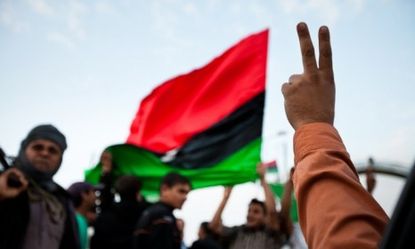Are the Mideast uprisings strengthening al Qaeda?
It isn't Osama bin Laden who's out there toppling autocratic Arab regimes — but will he and his terrorist network benefit anyway?

As Libya slips deeper into a bloody civil war, unyielding leader Moammar Gadhafi insists that al Qaeda is behind the revolt against him. Meanwhile, many, including Sen. John McCain (R-Ariz.), argue that the uprisings in Libya and across the Arab world are a "repudiation" of Osama bin Laden's network of terrorists. Others aren't so sure. Will the uprisings unleash pent-up support for Islamist extremism?
The revolts will strengthen al Qaeda: The uprisings represent "an enormous strategic step forward for al Qaeda," says Michael Scheuer at The Washington Post. Each dictatorship that falls creates "a more religion-friendly" political environment where bottled-up support for Muslim extremists will now gush forth. And with Egypt's Hosni Mubarak gone, Israel has lost its last "anti-Islamist shield." For bin Laden, who has declared war against both Israel and "the Arab tyrannies," this is a double victory.
"Why the Mideast revolts will help al Qaeda"
Subscribe to The Week
Escape your echo chamber. Get the facts behind the news, plus analysis from multiple perspectives.

Sign up for The Week's Free Newsletters
From our morning news briefing to a weekly Good News Newsletter, get the best of The Week delivered directly to your inbox.
From our morning news briefing to a weekly Good News Newsletter, get the best of The Week delivered directly to your inbox.
Actually, the uprisings make al Qaeda irrelevant: Al Qaeda has never been "more marginal than it is now," says Shahid Alam at the Yemen Observer. It recruits frustrated young people by calling for "terrorist attacks against local tyrannies or their foreign backers." But these uprisings, which have largely succeeded without violence from the protesters, are robbing the organization of its lifeblood, and undercutting its rationale.
"Washington, al Qaeda, and the Arab revolt"
Al Qaeda is down, but not yet out: Al Qaeda was "caught by surprise," says Musa Keilani at Al Arabiya, and it's trying to "muscle its way into the unrest" after the fact. But if new Arab leaders can guarantee stability and jobs, the region's "hopeful youth" will "shun al Qaeda." The real question is whether the governments replacing toppled regimes can satisfy protesters' demands. If the new regimes fail, don't count al Qaeda out.
Create an account with the same email registered to your subscription to unlock access.
Sign up for Today's Best Articles in your inbox
A free daily email with the biggest news stories of the day – and the best features from TheWeek.com
-
 Ottawa climate talks: can global plastic problem be solved?
Ottawa climate talks: can global plastic problem be solved?In the spotlight Nations aim to draft world's first treaty on plastic pollution, but resistance from oil- and gas-producing countries could limit scope
By Harriet Marsden, The Week UK Published
-
 Netherlands split on WFH for sex workers
Netherlands split on WFH for sex workersSpeed Read Councils concerned over 'nuisance' of at-home sex work, but others say changes will curb underground sex trade
By Arion McNicoll, The Week UK Published
-
 'He adored Trump, and then rejected him'
'He adored Trump, and then rejected him'Today's Newspapers A roundup of the headlines from the US front pages
By The Week Staff Published